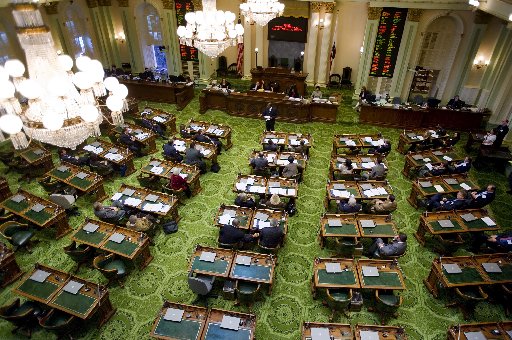Legislative Updates

These are the bills the Alliance is supporting:
AB 398 (Chu): School accountability: local control and accountability plans
Summary: Current law requires, on or before July 1, 2014, the governing board of each school district to adopt a local control and accountability plan using a template adopted by the State Board of Education. Current law requires the governing board of each school district to update its local control and accountability plan before July 1 of each year, and requires that annual update to be developed using a template adopted by the state board. This bill would make a nonsubstantive change to the latter provision.
Read our letter of support for AB 398 (Chu).
SCR 24 (Kamlager): Arts Education Month
Summary: This measure would proclaim March 2020 to be Arts Education Month and would encourage all elected officials to participate with their educational communities in celebrating the arts.
These are the bills the Alliance is following:
AB 1097 (Holden): California School Dashboard: local indicator: high school credit recovery
Summary: Current law requires the State Department of Education, in collaboration with, and subject to the approval of, the executive director of the state board, to develop and maintain the California School Dashboard, a web-based system for publicly reporting performance data on the state and local indicators. This bill would require the department to include high school credit recovery participation as a local indicator on the California School Dashboard.
AB 1240 (Weber): School accountability: local control and accountability plans: state priorities: pupil achievement
Summary: Current law requires a local control and accountability plan to include, among other things, a description of the annual goals to be achieved for each state priority, as specified, for all pupils and certain subgroups of pupils. This bill would require pupil achievement to be measured by, and as applicable, among other things required by existing law, separate calculations for (1) the percentage of pupils who have successfully completed courses that satisfy the requirements for entrance to the University of California and the California State University, (2) the percentage of pupils who have successfully completed courses that satisfy the requirements for career technical education sequences or programs of study that align with state board-approved career technical education standards and frameworks, as prescribed, and (3) the percentage of pupils who have successfully completed both types of courses described in (1) and (2).
AB 1466 (Irwin): State longitudinal education data system
Summary: Current law establishes the California Longitudinal Pupil Achievement Data System and requires a local educational agency to retain all data necessary to compile reports required by specified federal laws, including, but not limited to, dropout and graduation rates.This bill would state the intent of the Legislature to enact legislation that would better use data-informed decision making in pursuit of the state’s educational goals for its students, including by establishing a state longitudinal education data system, as specified.
SB 2 (Glazer): Statewide Longitudinal Student Database
Summary: Would express the intent of the Legislature to establish the Statewide Longitudinal Student Database to collect and store data regarding individual students as they matriculate through P–20, as defined, and into the workforce. The bill would require the California Postsecondary Education Commission to convene a review committee for purposes of advising the commission on the establishment, implementation, funding, and ongoing administration of the database.
SB 158 (Allen): Pupil assessment: academic achievement
Summary: Current law requires the State Board of Education to adopt statewide academically rigorous content standards in the core curriculum areas of reading, writing, and mathematics to serve as the basis for assessing the academic achievement of individual pupils, schools, school districts, and the California educational system. Current law makes these provisions inoperative on July 1, 2011.This bill would repeal these provisions.











